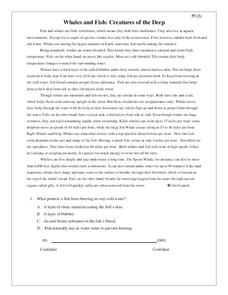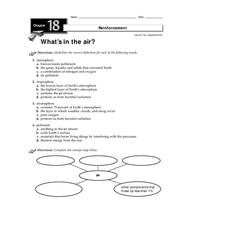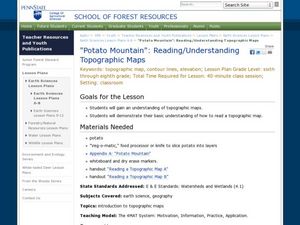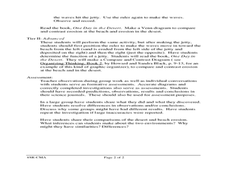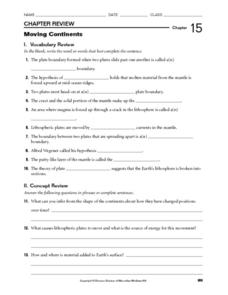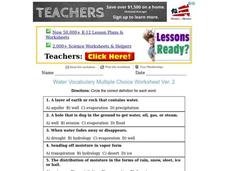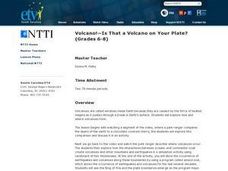Curated OER
How High Does the Atmosphere Go?
Pupils explain how relatively thin the atmosphere is, compared to the size of the planet, and determine the relative extent of the four major atmospheric layers.
Curated OER
Building a Better Sentence
Sentence construction is both a science and an art. This bare bones lesson ties an analysis of earth's geology to sentence formation. Although referenced as a major part of the activity, there are no links to the technology or resources...
Curated OER
Kids Astronomy
In this astronomy word scramble worksheet, students examine the 16 letter groupings and use the decoder to help them reveal the 16 astronomy terms listed at the bottom of the worksheet,
Curated OER
Volcanoes Crossword Puzzle
In this Volcanoes Crossword Puzzle worksheet, students solve a crossword puzzle by answering 13 questions related to volcanoes. An example question includes, "the outer layer of the earth."
Curated OER
Whales and Fish: Creatures of the Deep
Practice comparing and contrasting details in informational text with a reading passage about whales. It explains the ways that fish and whales are similar, as well as the ways they are different, and specific characteristics of various...
Curated OER
What's in the Air?
In this air worksheet, students will choose the correct definition for atmosphere, troposphere, stratosphere, and pollutant. Then students will complete a concept map showing what components make up air. This worksheet has 4 multiple...
Curated OER
Earthquake Crossword Puzzle
For this earthquake crossword puzzle, students complete a crossword using 13 clues about earthquake facts and plate tectonics.
Curated OER
Earthquakes and Volcanoes
In this earthquakes and volcanoes worksheet, students will review how volcanoes are formed and where they are found. Students will describe earthquakes and their magnitudes. Students will use a table to answer questions about tsunamis....
Curated OER
Geologic Time
In this geologic time worksheet, students review how fossils were formed and the events that mark the various geological eras and periods. This worksheet has 10 fill in the blank and 9 short answer questions.
Curated OER
"Potato Mountain": Reading/Understanding Topographic Maps
Students investigate how to read topographic maps. In this map reading lesson students complete a topographic map activity.
Curated OER
The Physical Environment
Fourth graders use damp sand, a baking pan, and water to simulate erosion. In this erosion lesson plan, 4th graders participate in a simulation to show what moving water does to land.
Curated OER
Water Cycle and Ecosystems
Young scholars explore the water cycle. In this investigative lesson, students examine the water cycle process. They will record their observations and discuss marine and freshwater ecosystems.
Curated OER
Petroleum Chemistry
In this petroleum chemistry worksheet, students review hydrocarbons which includes petroleum. Students understand the properties of petroleum and where it is found. This worksheet has 12 words in a crossword puzzle, 6 fill in the blank,...
Curated OER
Recycling Water
In this water worksheet, students review the steps involved in the water cycle. This worksheet has 9 fill in the blank and 3 short answer questions.
Curated OER
Moving Continents
In this moving continents worksheet, students review the different types of plate boundaries, what causes earthquakes, and where volcanoes are formed. This worksheet has 10 fill in the blank and 9 short answer questions.
Curated OER
Effects Of Weathering
Third graders simulate weathering and erosion using sand and soil. They define weathering and the ways in which surfaces become weathered. Working as a class, 3rd graders complete various activities that demonstrate physical and...
Curated OER
Water Vocabulary
In this water vocabulary instructional activity, students explore facts about water. Students complete fifteen multiple choice questions about water and it's characteristics.
Curated OER
Volcano! Is That a Volcano on Your Plate?
Students investigate where volcanos come from. In this volcano lesson, students watch videos do Internet research and participate in experiments to discover the cause of volcanos.
Curated OER
Air and Water in the Environment
Students demonstrate an awareness of air as a substance that surrounds us and takes up space, and whose movement we feel as wind. They predict and describe how local weather conditions affect living things, including themselves.
Curated OER
Plate Tectonics Review
In this plate tectonics worksheet, students review concepts such as the types of plate boundaries, the concept of continental drift, sea-floor spreading, earthquakes, and plate tectonics. They match 30 terms with their definitions.
Curated OER
Areology-The Study of Mars
Students examine core samples from Mars and discover what they can use it to tell the history of Mars. In this core sample lesson students create and analyze their own core samples then eat them at the end.
Curated OER
Rock Cycle Review
In this rock cycle worksheet, students review major concepts related to rock formation by answering 15 multiple choice questions and matching 15 terms to their definitions. Students identify 7 rocks as metamorphic, sedimentary, or...
Curated OER
How to Make a Rock
Second graders watch demonstrations and conduct experiments that show the three different types of rocks: igneous, sedimentary, and metamorphic.
Curated OER
Ecosystems Beneath the Surface
Sixth graders create a KWL chart about microorganisms. In this biology lesson, 6th graders create and label a diagram on a microbial mat. They investigate the processes involved in the carbon, oxygen and sulfur cycles.






